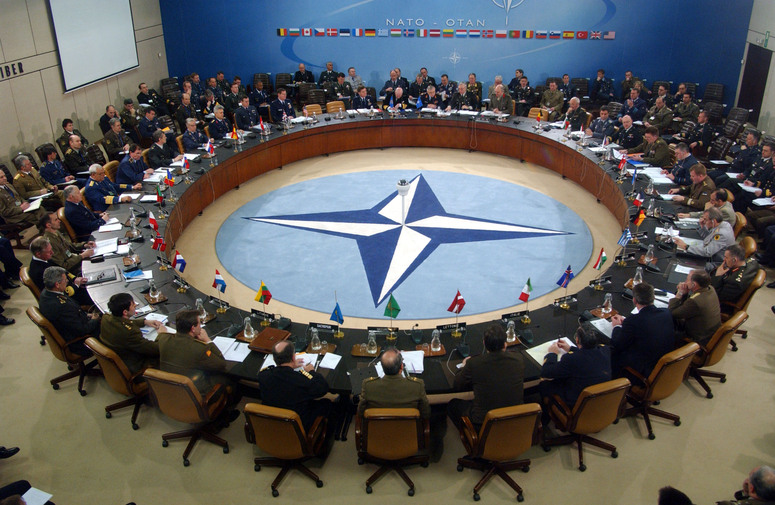
North Atlantic Treaty Organization (NATO) Secretary-General Jens Stoltenberg has been accused of once again escalating tensions with Russia by suggesting that the United States-led military alliance may put more nuclear weapons on standby, according to Kremlin spokesman Dmitry Peskov.
Stoltenberg revealed that consultations are ongoing among member nations about moving some warheads from their respective nuclear stockpiles to combat readiness. He emphasized that NATO might soon face an unprecedented situation with two nuclear-powered adversaries, China and Russia, and needs to send a clear message to these foes. (Related: NATO countries planning expanded “land corridors” to rush more troops to the front lines with Russia.)
Peskov accused Stoltenberg of double standards, noting that the NATO chief had previously criticized Russian President Vladimir Putin for "nuclear saber-rattling" when discussing Russia’s nuclear arsenal. Peskov claimed that Putin only makes such remarks when directly questioned by journalists.
Peskov further noted that Stoltenberg's statements conflict with the joint declaration signed at a recent peace summit in Switzerland, held on behalf of Ukraine. The declaration asserts that “any threat or use of nuclear weapons in the context of the ongoing war against Ukraine is inadmissible.” Peskov described Stoltenberg’s comments as a move to heighten tensions.
Earlier this month, Putin addressed the issue during a meeting with foreign media, stating that nuclear-armed nations should avoid making nuclear threats but warning that Russia would follow its nuclear doctrine if its sovereignty or territorial integrity were threatened.
"If someone’s actions pose a threat to our sovereignty and territorial integrity, we consider ourselves in the right to use all means at our disposal," Putin said. "This issue must not be treated lightly."
Stoltenberg reiterated NATO's goal of a world without nuclear weapons but argued that as long as Russia, China and North Korea possess nuclear capabilities, NATO must maintain its own to avoid a more dangerous world.
Civil society calling on NATO to step back from stoking tensions
The International Campaign to Abolish Nuclear Weapons (ICAN), a broad, inclusive campaign, focused on mobilizing civil society around the world to support the specific objective of prohibiting and eliminating nuclear weapons, called on both sides to step back and reduce tensions.
Alicia Sanders-Zakre, ICAN’s Policy and Research Coordinator, urged all parties to de-escalate tensions: “A day after joining in the condemnation of Russia for its unacceptable nuclear threats, the NATO Secretary General is now brandishing a nuclear response. This dangerous escalation is inherent to the doctrine of deterrence, which ICAN has long warned about. Both sides need to step back and reduce tensions.”
Sanders-Zakre continued: "NATO countries hosting U.S. nuclear weapons should inform their citizens that these inhumane weapons are on their soil without their consent. Transparency should be a priority for NATO. NATO members like Belgium, Germany, Italy, the Netherlands and Turkey, along with Belarus, which conducts nuclear exercises with Russia, should not be showing their willingness to participate in the potential killing of millions."
Proponents of the deterrence doctrine claim it ensures stability and maintains peace, but in reality, it does the opposite. It promotes proliferation, leading more countries to acquire nuclear weapons, as seen with North Korea, and encourages reckless military engagements. History has shown that it also leads to dangerous brinkmanship, exemplified by the Cuban Missile Crisis, which nearly resulted in a nuclear catastrophe that was only narrowly avoided by chance.
Nuclear experts have criticized Stoltenberg's ill-considered escalatory rhetoric. In the current Ukraine crisis, it heightens risks, especially for the European populations that NATO officials, including the Secretary-General, are supposed to protect.
The states party to the United Nations' Treaty on the Prohibition of Nuclear Weapons have stated that the doctrine of deterrence is a threat to global security and an obstacle to disarmament. The use, or even the threat of use, of nuclear weapons is not to be taken lightly as it endangers civilian populations worldwide.
Stoltenberg's recent comments about NATO being a nuclear alliance underscore the need for him, and others who support the outdated deterrence doctrine, to remember that behind these words are weapons designed to cause massive civilian harm.
Watch this clip showing how NATO is rejecting peace with Russia.
This video is from the channel PureTrauma357 on Brighteon.com.
More related stories:
NATO allies "inching closer" to deploying soldiers to Ukraine.
NATO to overstep Russia’s red line as it mulls sending troops to train Ukrainian armed forces.
6 NATO members attempting to build an ANTI-DRONE WALL along border with Russia.
Sources include:
Please contact us for more information.















